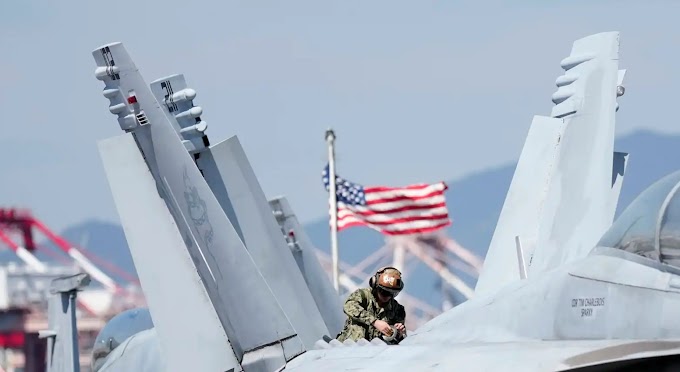The U.S. Senate passed the National Defense Authorization Act to provide Taiwan with tens of billions of military aid for five years.
CAPITOL HILL- On Thursday night, December 15, the U.S. Senate approved the defense budget plan for the upcoming fiscal year. The package will now be forwarded to the White House for the president to sign into law. The plan, according to lawmakers, would give the Pentagon crucial funding to bolster the American military. The measure also proposes to provide Taiwan a total of $10 billion in military aid over the course of five years in order to improve its defensive capabilities against Chinese threats.
The almost $858 billion National Defense Authorization Act (NDAA) for the fiscal year 2023 was overwhelmingly approved Thursday night by a vote of 83-11. The budget suggested by President Joe Biden earlier this year will be increased by $45 billion under the legislation.
The bill will be submitted to the White House for President Biden to sign into law after receiving backing from the House of Representatives last week.
After the law passed after months of bipartisan discussions in both chambers, Sen. Jack Reed, D-RI, chairman of the Senate Armed Services Committee, declared that this is the most significant vote of the year.
Senator Reed of Rhode Island stressed the need of passing the defense budget authorization measure by saying, "I've said it before, and I'm not the only one who said it, right now the globe is in the most dangerous situation I've ever seen in my life." importance.
The law includes a variety of clauses designed to improve the air power, ground defense, and cybersecurity of the US military.
In order to help Ukraine fend against Russian incursions, the bill proposes to give Ukraine $800 million in security aid. The plan also allots $6 billion for the Europe Deterrence Initiative, which was established in response to Russia's annexation of Crimea in 2014 in order to strengthen the readiness of American forces there to thwart potential Russian aggression.
The Pacific Deterrence Initiative (Pacific Deterrence Initiative) will get an additional $11.5 billion from the bill to help it run more smoothly and increase US military capabilities in the Indo-Pacific.
Speaking on the Senate floor on Thursday morning, Senate Minority Leader Mitch McConnell (R-KY) highlighted the threat presented by China and stressed the vital role that the National Defense Authorization Act would play for the United States military might and presence in the Indo-Pacific area. According to him, the law would significantly improve ties between the US and its partners and allies in the Indo-Pacific area.
From Asia to the Middle East to Africa and beyond, China is deliberately undercutting American ties and interests. Our own power will grow thanks to the NDAA. According to McConnell, it prioritizes the Indo-Pacific region's crucial ties.
Balancing He said, "China will demand a coordinated effort of greater, deeper relations between the United States and our like-minded allies and partners, including everything from access to military facilities, joint operations, and increased By providing our partners the military capabilities they require, we can continue to be a win-win situation for security and the economy.
Give Taiwan 10 billion in military funding over a five-year period
The National Defense Authorization Act for the coming year contains military support to Taiwan, which has garnered considerable interest from all spheres of society.
Sen. Bob Menendez, D-NJ, the head of the Senate Foreign Relations Committee, presented the Taiwan Enhanced Resilience Act (TERA), which is included in the legislation. The Taiwan Policy Act (Taiwan Policy Act), which was approved by the Senate Foreign Affairs Committee, served as the foundation for the bill's main provisions on Taiwan's security and defense. Menendez and Republican Senator Lindsey Graham (Sen. Lindsey Graham, R-SC) crossed party lines to present the Taiwan Policy Act in June of this year, and it was approved by the Senate Foreign Relations Committee in September.
By establishing, for the first time, a particular military modernization plan for Taiwan, the Strengthening Taiwan Resilience Act of the National Defense Authorization Act would considerably boost the U.S. defense alliance with Taiwan. Through the Foreign Military Financing (FMF) program of the U.S. State Department, the U.S. will be permitted to give Taiwan up to $2 billion per year in non-remunerated military assistance from 2023 to 2027, for a maximum of $10 billion in five years.
The measure also permits Taiwan to receive direct loans for foreign military financing of up to $2 billion.
The measure also grants the President the power to withdraw from Taiwan up to $1 billion in defense goods or services annually through the exercise of the Presidential Drawdown Authority (PDA). In order to immediately supply defense items and services to foreign international organizations from the Department of Defense equipment inventory without Congressional permission, the President of the United States may use a Presidential Withdrawal Authorization.
Concerns over the security situation in the area are escalating as a result of China's increasingly regular military aggression in the Taiwan Strait. The voice of reacting to military threats from China has also become stronger as a result of the bipartisan support in the US Congress for giving Taiwan defense aid to improve its self-defense capabilities.
Bipartisan foreign leaders from both parties signed a letter to the leadership of Congress on December 15 requesting that the comprehensive government appropriations bill that is currently being negotiated and discussed by Taiwan provides at least $500 million in foreign military financing. The letter was signed by the Chairman of the Senate Foreign Relations Committee Menendez, Top Republican Sen. Jim Risch (R-ID), Chairman of the House Foreign Affairs Committee Rep. Gregory Meeks (D-NY), and Michael McCaul, R-TX.
Legislators sent letters to Senate Majority Leader Chuck Schumer, House Speaker Nancy Pelosi, and House Minority Leader Kevin McCarthy (R-CA). Chuck Schumer, the majority leader in the Senate, and Mitch McConnell, the minority leader, both announced that they had asked for $1 billion in emergency funds to support the Taiwan Enhanced Resilience Act, or TERA, in the Presidential Withdrawal Authorization project to provide Taiwan the power.
The congressmen said in a joint letter that Taiwan may advance its asymmetric strategy against China by restarting and expanding vital production lines to create weapons that are no longer utilized by the U.S. military but are crucial to our allies.
The grants, according to lawmakers, show the depth of America's commitment and aid in securing ongoing backing for ongoing battles.
The National Military Authorization Act for Fiscal Year 2023 also calls for accelerating Taiwan's acquisition of weapons and developing training programs to strengthen Taiwan's defense capabilities.
Joint military drills with Taiwan are a crucial component of boosting combat preparedness, according to Congress.
The ultimate allocation amount is decided by the Appropriations Committee of Congress, and the National Defense Authorization Act is simply responsible for creating defense spending authorization items. It was previously stated that certain Democratic Party members had reservations about giving Taiwan such a large quantity of military aid. As a result, it is still unclear how much military assistance for Taiwan will be approved by the Appropriations Committee.
A comprehensive government appropriations measure that would fund government operations until September 30 of the next year is now being negotiated by members of both parties in the Senate and House of Representatives.








